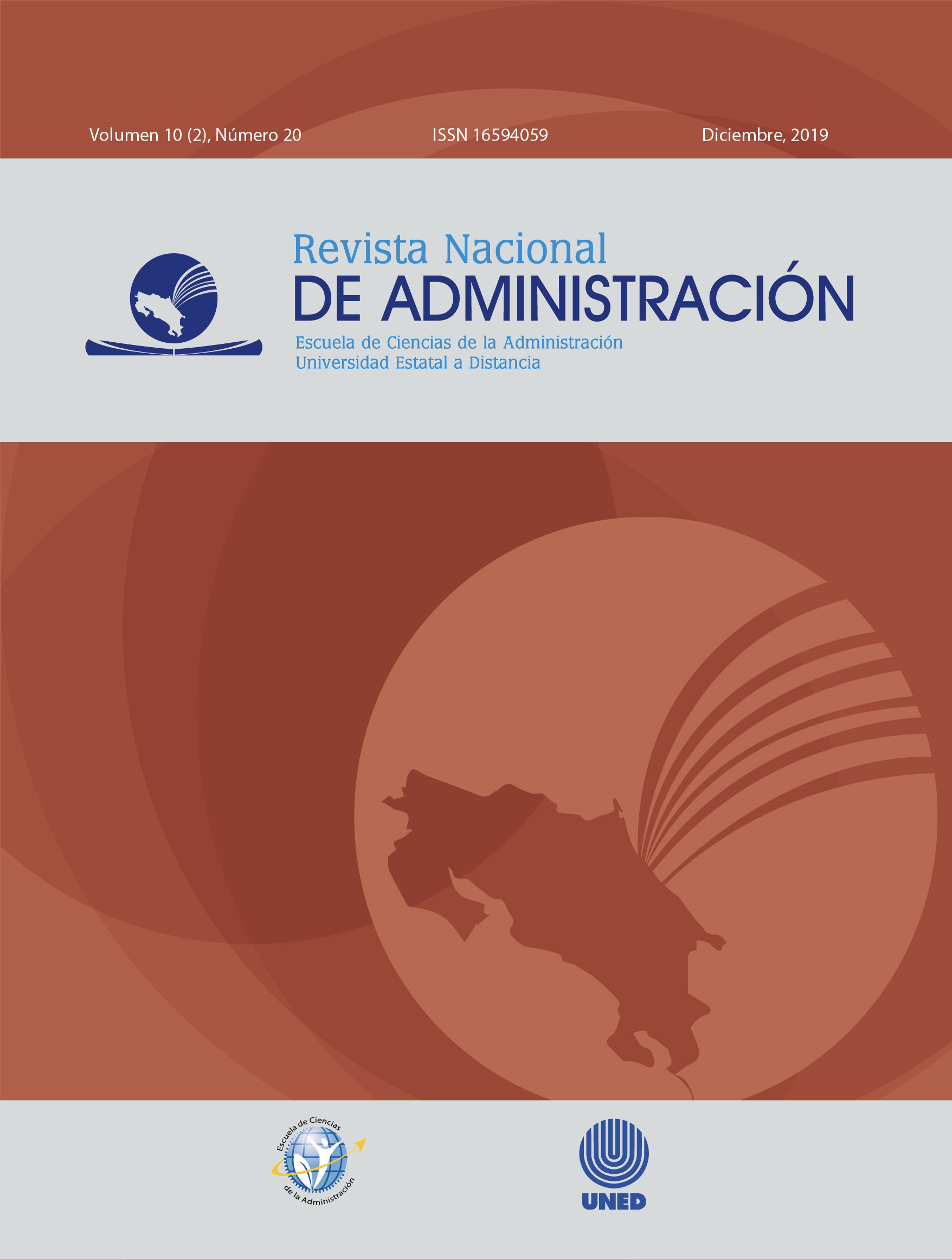KEY SUCCESS FACTORS IN THE PUBLIC ADMINISTRATION FIELD
DOI:
https://doi.org/10.22458/rna.v10i2.2739Keywords:
Global competitiveness index, social progress index, intentional change model, decision taking model, public valueAbstract
This essay is based on the methodology of systematization of experiences as part of a qualitative approach, whose aim is to contribute to the generation of knowledge for the analysis and discussion of a fundamental issue: public management.
The proposal is based on the academic exchange at the level of Latin American organizations, in which the experiences that allow enriching the theoretical discussion and, with a critical perspective, addressing its applicability in the daily work are shared.
This article describes the key success factors to achieve a better performance within the scope of public administration. Institutional management is strengthened by means of a constant reflection on the individual endeavor that provides in turn added value to the collective welfare. There is an encompassing overview of the knowledge of the international and national context elements by analyzing the good practices of the new public management.
References
Bateman, T. y Snell, S. (1999). Administración, una ventaja competitiva. México, Editorial McGraw-Hill.
Boyatzis, Richard y McKee, A. (2003). Liderazgo emocional. Estados Unidos: Debolsillo.
Foro Económico Mundial (2016). Índice de Competitividad Global 2016-2017. Suiza.
Foro Económico Mundial (2017). Índice de Competitividad Global 2017-2018. Suiza.
INCAE Business School (2017), Centro Lationamericano para la Competitividad y Desarrollo Sostenible (CLACDS), Costa Rica.
Goleman, D.; Boyatzis, R. y McKee, A. (2013). Primal Leadership. Estados Unidos: Harvard Business Review Press.
Jericó, P. (2008). La nueva Gestión del Talento: construyendo compromiso. Madrid: Prentice Hall.
Marciniak, R. (2017). El benchmarking como herramienta de mejora de la calidad de la educación universitaria virtual. Ejemplo de una experiencia polaca. Educar, 53(1).
Pérez de Maza, T. (2016). Sistematización de experiencias en contextos universitarios. Guía didáctica. Caracas: Universidad Nacional Abierta, Ediciones del Vicerrectorado Académico.
Porter, M. y Stern, S. (2017). Índice de Progreso Social 2017. Estados Unidos.
Sánchez, C. (2016). Una propuesta epistemológica para la sistematización de experiencias generada desde la reflexión sobre la práctica. Revista Interamericana de Educación, Pedagogía y Estudios Culturales, 9(2), julio-diciembre.
Sánchez, A. (2010). El artículo sistematización de experiencias: construcción de sentido desde una perspectiva crítica. Revista Virtual de la Universidad Católica del Norte, 29.
Tapella, E. y Rodriguez-Billela, P. (2014). Sistematización de experiencias: una metodología para evaluar intervenciones de desarrollo. Revista de Evaluación de Programas y Políticas Públicas, 3, 80-116.
Ricoy, C. (2006). Contribución sobre los paradigmas de investigación. Educação, 31(1), undefined-undefined. [fecha de Consulta 29 de Noviembre de 2019]. ISSN: 0101-9031. Disponible en: https://www.redalyc.org/articulo.oa?id=1171/117117257002
Universidad Estatal a Distancia. Lineamientos de Política Institucional (2015-2019).
Published
How to Cite
Issue
Section
License
Aquellos autores/as que tengan publicaciones con esta revista, aceptan los términos siguientes:
- Los autores/as conservarán sus derechos de autor y garantizarán a la revista el derecho de primera publicación de su obra, el cuál estará simultáneamente sujeto a la Licencia de reconocimiento de Creative Commons que permite a terceros compartir la obra siempre que se indique su autor y su primera publicación esta revista.
- Los autores/as podrán adoptar otros acuerdos de licencia no exclusiva de distribución de la versión de la obra publicada (p. ej.: depositarla en un archivo telemático institucional o publicarla en un volumen monográfico) siempre que se indique la publicación inicial en esta revista.
- Se permite y recomienda a los autores/as difundir su obra publicada en la revista a través de Internet (p. ej.: en archivos telemáticos institucionales o en su página web).

